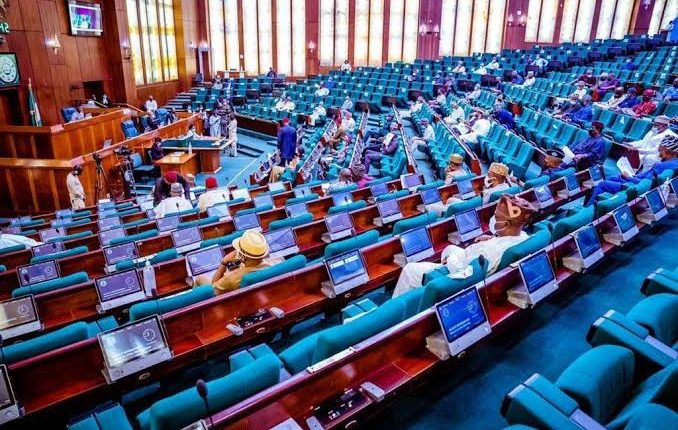
Reps order CBN to suspend implementation of cybersecurity levies on Nigerians
- As Northern elders say cybersecurity levy arbitrary, illegal, out of touch

Following a barrage of protests ,the House of Representatives has called on the Central Bank of Nigeria (CBN) to halt the implementation of the Cybersecurity Levy on Nigerians.
The resolution followed the adoption of a motion on the “Urgent Need to Halt and Modify the Proposed Implementation of the Cybersecurity Levy Proposed by the Central Bank of Nigeria”.

The motion was moved by the House Minority leader, Mr. Kingsley Chinda on behalf of the three hundred and fifty nine other members of the House.
Hon. Chinda said that the House has been undaunted with calls since the levy was mentioned and there was need to address it.
The motion said that “The House: Notes that the Central Bank of Nigeria through a Circular to all Commercial, Merchant, Non-interest and Payment Service Banks; other Financial Institutions, Mobile Money Operators and Payment Service Providers (“CBN Circular”) dated 6th May, 2024 informed Nigerians of a proposed 0.5% levy on electronic transactions in line with Section 44(2)(a) of the Cybercrimes (Prohibition, Prevention, etc.) (Amendment) Act, 2024 (“Cybercrimes Act’). Also notes that Section 44(2)(a) of the Cybercrimes (Prohibition, Prevention, etc.) (Amendment) Act, 2024 provides that “a levy of 0.5% (0.005) equivalent to half percent of all electronic transactions value by business specified in the Second Schedule to this Act” be paid into the Cybersecurity Fund. Further notes that businesses which the said Section 44(2)(a) refers to are listed in the Second Schedule to the Cybercrimes Act to be: a) GSM Service Providers and all telecommunication companies; b) Internet Service Providers; c) Banks and Other Financial Institutions; d) Insurance Companies and e) Nigerian Stock Exchange”.
It also said that the House was concerned that the CBN circular mandates all Banks, Other Financial Institutions and Payments Service Providers to implement the Cybercrimes Act by applying the levy at the point of electronic transfer origination as “Cybersecurity Levy” and remitting same.
“Further concerned that the wordings of the CBN Circular leaves the CBN directive to multiple interpretations including that the levy be paid by Bank customers, that is, Nigerians against the letters and spirit of Section 44(2)(a) and the Second Schedule to the Cybercrimes Act, which specifies the businesses that should be levied accordingly, Worried that this act has led to apprehension as Civil Society Organisations and Citizens have taken to conventional and Social media to call out the Federal Government, give ultimatums for a reversal of the “imposed levy on Nigerians” among other things. Further worried that unless immediate Pragmatic steps are taken to halt the Proposed action of the CBN, the Cybercrime Act shall be implemented in error at a time when Nigerians are experiencing the aftermath of multiple removal of subsidies from petroleum, electricity and so on and the rising inflation”. The motion said.
The House therefore resolves to direct the Central Bank of Nigeria to withdraw the ambiguous circular and issue an unequivocal Circular in line with the letters and spirit of the Law.
It also directed the House Committees on Banking Regulations, and Banking other Ancillary Institutions to guide the Central Bank of Nigeria properly.
The Ango Abdullahi-led Northern Elders Forum, on Thursday, condemned the Central Bank of Nigeria’s decision to impose a cybersecurity levy on bank customers across the country.
The NEF through its Director of Publicity and Advocacy, Abdul-Azeez Suleiman, in a statement, released in Kaduna, expressed dissatisfaction with the policy.
The Forum cited the escalating costs associated with banking transactions as a result of multiple charges, describing CBN’s directives as “arbitrary, illegal, and out of touch with the realities faced by Nigerians.
The northern body, therefore, called on the government to reconsider the policy and explore alternative measures to ease the financial strain on individuals while still promoting the use of electronic payments.
The NEF pointed out that the introduction of cybersecurity levies, in addition to existing fees such as stamp duty, transfer fees, value-added tax, and SMS charges, has placed an unbearable financial burden on individuals engaging in electronic transactions.
The forum highlighted the various charges that bank customers now face, including cybersecurity levies ranging from ₦5 on ₦1,000 to ₦50,000 on ₦10,000,000 transactions, transfer fees, stamp duty, and value-added tax. These additional costs have significantly increased the overall expense of electronic transactions for both senders and receivers.
While acknowledging the importance of cybersecurity in safeguarding electronic transactions, the NEF emphasised the need for a more balanced approach that ensures the costs of security measures are reasonable and do not excessively burden bank customers.
The NEF said that in a country already grappling with economic challenges and hyperinflammatory conditions, the additional financial burden imposed by the cybersecurity levy was unjust and unfair, and urged the government and relevant stakeholders to find a sustainable solution that strikes a fair balance between enhancing cybersecurity and alleviating the financial strain on the Nigerian populace.
“It is imperative that the administration takes into account the concerns raised by a vast majority of Nigerians and prioritises policies that protect the interests of the people while also fostering economic growth and development.”
The forum’s stance highlights the importance of considering the impact of regulations on ordinary citizens and advocating for measures that promote financial inclusion and alleviate economic challenges.
“It is crucial that the government listens to the concerns of organisations like the NEF and works towards implementing policies that benefit all Nigerians, rather than burdening them with additional costs and hardships.
“It is essential to strike a delicate balance between enhancing cybersecurity and easing the financial burden on the populace, particularly at a time when the Nigerian economy is facing significant challenges due to inflation and other economic factors,” it added.
The NEF urged the authorities and relevant stakeholders to engage in meaningful review and find a solution that addresses the legitimate concerns raised by the public regarding the cybersecurity levy.



